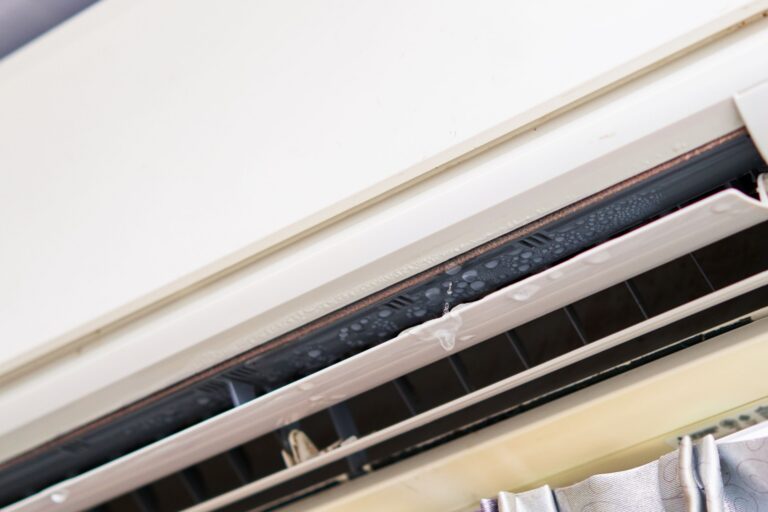Did you know that nearly 90% of U.S. households rely on air conditioning? Yet, many homeowners don’t realize something’s wrong until they spot water dripping from their vents. While a leaking AC vent might seem like a minor annoyance, it often signals bigger HVAC issues. If left unchecked, it can damage your home and promote mold growth.
If you’ve ever noticed water dripping from your AC vent, you’re definitely not alone. Let’s dive into why this happens and what you can do to fix it—no HVAC expertise needed.
What Does It Mean When Water Is Leaking from My AC Vent?
When water starts leaking from your AC vents, it usually means there’s excess moisture building up inside your system. Your air conditioner removes humidity from the air as it cools your home. But if something blocks or disrupts this process, water can collect and drip out of places it shouldn’t—like your vents.
Here are the 7 most common reasons why your AC vent may be leaking water:
1. Clogged Condensate Drain Line
What happens: Your AC pulls moisture from the air, which drains out through a tiny pipe called the condensate drain line. If this line gets blocked by dirt, algae, or debris, water can back up and overflow into your air ducts.
Signs to watch for:
-
Water leaking from ceiling vents
-
Musty smells
-
Overflowing drain pan
How to fix it: A professional technician can clear the blockage using suction or special tools. Regular maintenance helps prevent this problem.
2. Dirty Air Filters
What happens: When air filters get clogged, airflow slows down. This can cause your evaporator coils to freeze. When the ice melts, excess water drips into your ductwork.
Signs to watch for:
-
Weak airflow
-
Ice buildup on your AC unit
-
Water dripping from vents after thawing
How to fix it: Replace your air filters every 1 to 3 months. It’s simple, affordable, and keeps your system running smoothly.
3. Low Refrigerant Levels
What happens: Low refrigerant causes the coils to get too cold, leading to ice formation. When the ice melts, it can cause water leaks.
Signs to watch for:
-
Poor cooling performance
-
Hissing or bubbling noises
-
Water near indoor vents
How to fix it: Only a licensed HVAC technician should check and recharge refrigerant. Handling refrigerant yourself can be dangerous.
4. Poor Insulation Around Air Ducts
What happens: Without proper insulation, warm air touching cold ducts causes condensation, leading to water buildup and leaks from your vents.
Signs to watch for:
-
Water stains on ceilings or walls
-
Leaks only from certain vents
-
More leaks during humid weather
How to fix it: Improve insulation around your ductwork, especially in hot and humid areas.
5. Leaky or Disconnected Ducts
What happens: Ducts can shift or become loose over time. When moist air sneaks in through leaks, condensation forms, causing drips from vents.
Signs to watch for:
-
Uneven cooling in rooms
-
Unusual hissing sounds
-
Rising energy bills
How to fix it: A professional can reseal or reconnect ducts to stop leaks.
Pro tip: This often happens after attic work or home renovations.
6. Overflowing Drain Pan
What happens: The drain pan catches moisture from the evaporator coils. If it’s cracked, rusty, or clogged, water won’t drain properly and will leak out.
Signs to watch for:
-
Puddles around your HVAC unit
-
Leaks after long AC cycles
-
Visible rust or cracks in the pan
How to fix it: Replace or clean the drain pan during regular HVAC service.
7. Improper AC Installation or Sizing
What happens: An AC system that’s too large or improperly installed may short-cycle, turning on and off quickly. This reduces moisture removal, causing leaks.
Signs to watch for:
-
Frequent on/off cycles
-
Humid indoor air
-
Water leaks from multiple vents
How to fix it: A licensed technician can evaluate your system’s size and installation and recommend adjustments or replacements.
How Serious Is an AC Water Leak?
Water leaking from your AC might not seem as alarming as smoke or sparks, but it can cause serious damage:
-
Ruined drywall or ceilings
-
Mold and mildew growth
-
Damaged insulation and ductwork
-
Increased repair costs if ignored
That’s why it’s important to address leaks promptly.
How to Prevent Water Leaks from Your AC Vents
-
Schedule Regular HVAC Maintenance: Have a technician inspect your system every spring and fall.
-
Change Your Filters Often: Set monthly reminders to keep filters clean.
-
Check for Moisture in the Attic or Ceiling: Early detection can save you money.
-
Use a Smart Thermostat: Better humidity control means fewer leaks.
-
Insulate Your Ducts: Especially in attics and crawl spaces.
Final Thoughts
Water leaking from your AC vent is a sign you shouldn’t ignore. Whether it’s a clogged drain line, dirty filter, or poor insulation, these issues are usually fixable with some professional help.
By staying on top of regular maintenance and acting quickly, you can avoid costly repairs and keep your home comfortable and dry. Don’t let a small leak turn into a major problem—schedule your HVAC inspection today!
